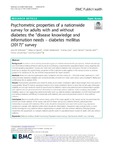Psychometric properties of a nationwide survey for adults with and without diabetes: the “disease knowledge and information needs – diabetes mellitus (2017)” survey
Stühmann, Lena M.
Paprott, Rebecca
Heidemann, Christin
Ziese, Thomas
Hansen, Sylvia
Zahn, Daniela
Scheidt-Nave, Christa
Gellert, Paul
Background
In order to close existing information gaps on diabetes-related health perceptions, diabetes knowledge, and information-seeking behaviors among adults in Germany, a representative population-based survey targeting the German-speaking population 18 years and older with and without diabetes was conducted. The aim of the present work was to analyze the psychometric properties of the multi-item scales, applied in the survey in order to provide guidance for decisions on the use of these measurements for future research.
Methods
Based on data from participants who completed the final survey (N = 1479 with known diabetes; N = 2327 without known diabetes) reliability and unidimensionality of multi-item scales were tested using Cronbach’s Alpha and confirmatory factor analysis (CFA).
Results
Psychometric properties and model fit varied across scales. Cronbach’s alpha values ranged from very good to unacceptable. Model fit indices suggested evidence of a single underlying factor in some but not all scales. Adequate reliability and at least mediocre model fit were found for diabetes distress and patient-provider-relationship in people with diabetes and for perceived level of information in individuals without diabetes. Scales revealing inacceptable reliability values or not suggesting unidimensionality were e.g. diabetes-related stigmatization in both individuals with and without diabetes, self-efficacy in individuals with diabetes, and perceived personal control in those without diabetes.
Conclusion
Based on results of the current study, some of the scales applied in the survey can be recommended for present and future analyses of the survey data and for future surveys (e.g. diabetes distress, patient-provider-relationship in people with diabetes). Other scales should be interpreted and used with caution (e.g. depressive symptoms in people with diabetes) while others should be reformulated, interpreted only as single items, or need further investigation (e.g. diabetes-related stigmatization in people with and without diabetes). Findings provide researchers the opportunity to evaluate diabetes-specific scales in population-based studies of adults with and without diabetes.

